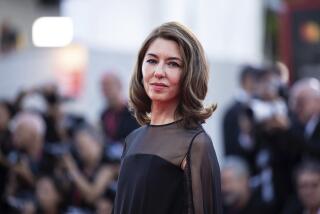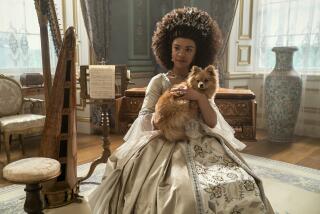‘The Buccaneers’ may be more ‘Bridgerton’ than Edith Wharton
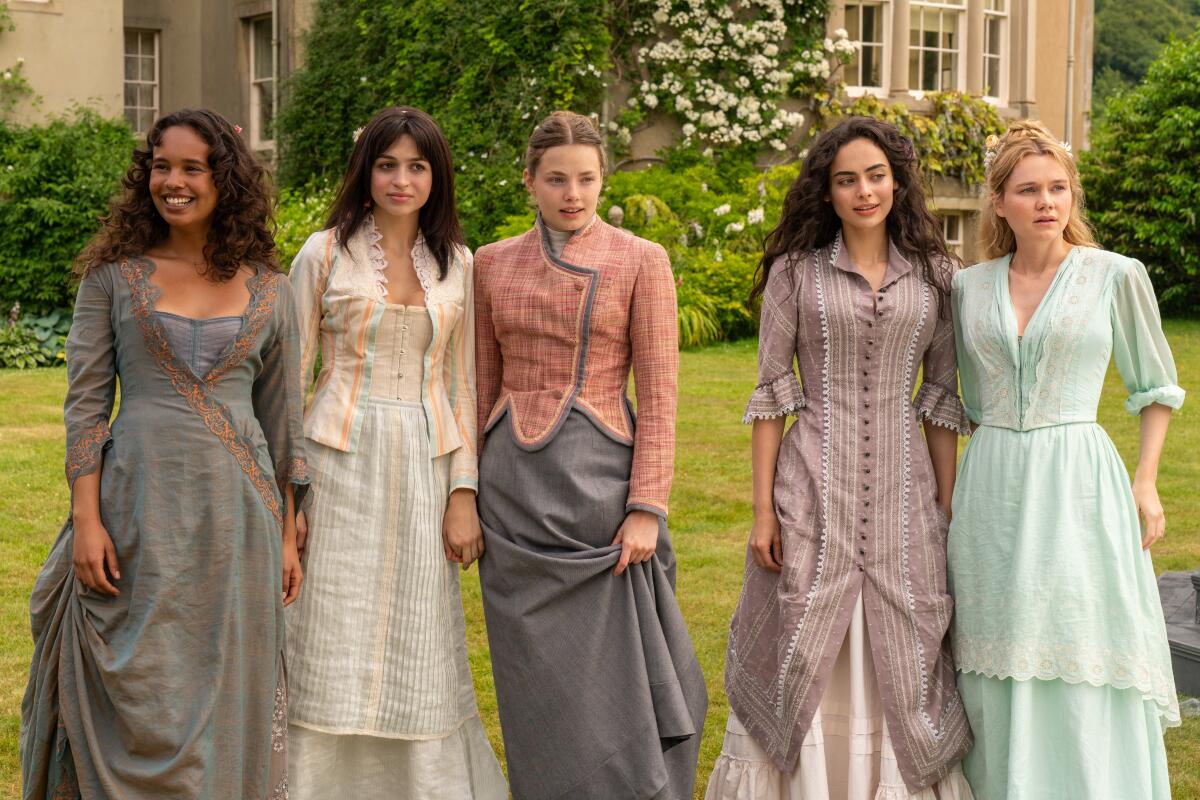
- Share via
Set in the 1870s, Edith Wharton’s final novel, “The Buccaneers,” concerns the adventures of five rich — but not the right sort of rich — young American women who, finding the doors of New York society closed to them, journey to London, where impoverished aristocrats are eager to trade Yankee money for British titles. You may recognize that not uncommon convention from “Downton Abbey,” whose Earl of Grantham married American heiress Cora Levinson to keep his estate alive.
Fans of Wharton hoping to find some sense of her in Apple TV+’s wayward adaption of the novel, which premieres Wednesday, may well be disappointed. And future fans of this series (and I reckon there will be some), unfamiliar with the author, may well be confused if they ever come to read her. They will recognize the names, certain elements of the plot and stray lines of dialogue; but nearly all of what’s here is the work of series creator Katherine Jakeways, who has fashioned a female-forward, post-teen soap opera less interested in exploring the conventions of 1870s high society than in exploiting those of 21st century television.
Riding along on a pop-punk soundtrack, souped up with extra-textual innovations — including dark family secrets and, almost inevitably, matters of sex and sexual orientation — and dialogue that switches between period formality and modern vernacular, the series owes its existence as much to the success of Netflix’s “Bridgerton” or the model of “Dickinson” (also on Apple TV+) as to any particular interest in Wharton.
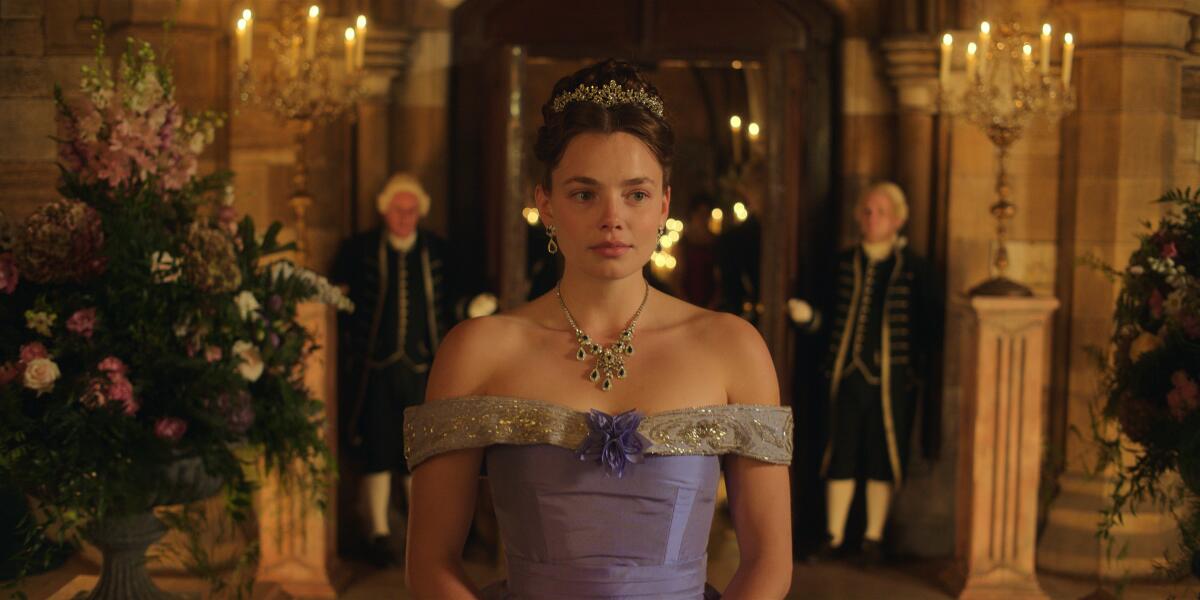
Our heroine is young Nan St. George (Kristine Froseth) — we know this because her first words are “I was never supposed to be the main character” — who, with her beautiful older sister Jinny (Imogen Waterhouse) and the Elmsworth girls Lizzy (Aubri Ibrag) and Mab (Josie Totah) , have come together as bridesmaids to celebrate their saucy, sassy friend Conchita (Alisha Boe), who‘s going to wed Lord Richard Marable (Josh Dylan).
Jinny: Girls, here’s to a new world. Marriages, men, parties.
Conchita: Not particularly in that order.
Lizzy: Which comes first?
Conchita: Darlings, we always come first ... Shall we swear on it in blood or champagne?
All: Champagne!
While Wharton is quite clear that their group trip to London is an intentional matter of last resort for the single girls, owing to their being shut out of New York high society and opportunities to make a good marriage — sort of the point — here they merely accept an invitation from the groom’s mother Lady Brightlingsea (Fenella Woolgar), who would like to marry off her other son, Lord James Seadown (Barney Fishwick) to another pile of money.
And off they go, inefficiently chaperoned by Mrs. St. George (Christina Hendricks) and Mrs. Elmsworth (Viss Elliot Safavi), who provides pitiable comic relief. (The series is not really funny, something of a surprise considering that Jakeways’ career as a writer and performer has largely been in comedy.) Though Nan is not in the market for a husband, she will, on the strength of her unselfconscious exuberance, ready wit and obvious goodness attract the interest of not one but two hunky aristocrats. (Not coincidentally, they are the series most seriously Hot Dudes — and best friends, just to raise the stakes.) Guy Thwarte (Matthew Broome) first sees her climbing down the front of a Fifth Avenue mansion at Conchita’s wedding; they will exchange tentative significant looks and companionable banter before he leaves the party early. They’ll meet again at a London ball, where young debutantes hold paddles identifying them by number, as if at auction. (They are the goods, not the bidders.)
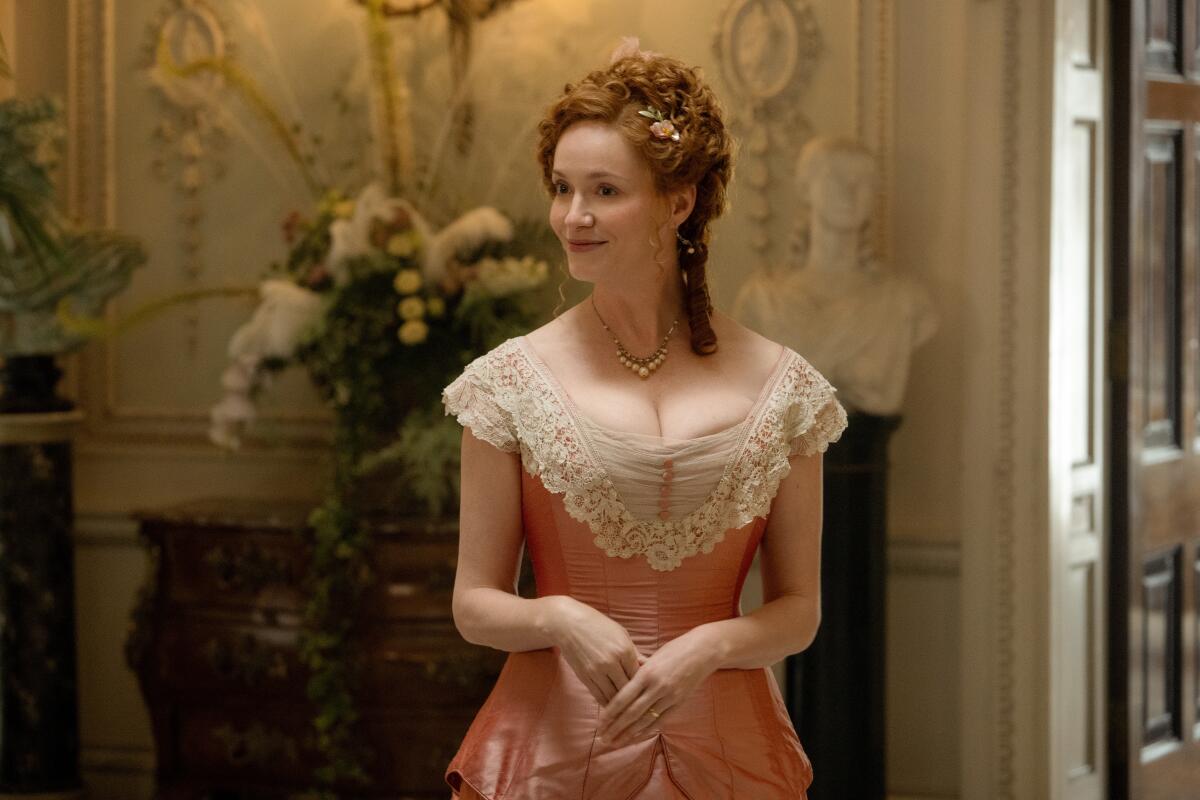
Theo, Duke of Tintagel (Guy Remmers), whom we have already seen brooding romantically from a lonely promontory, will first glimpse her at that same ball putting a couple of rude British misogynists in their place. Nan will finally meet him when they happen to be bathing at the same, otherwise empty stretch of beach. He’s made glad by the fact that she doesn’t know he’s a duke, and not an impoverished one, but, shown his plein-air painting, takes him for an artist. (Wharton’s duke, by contrast, is into clocks.)
Guy, who is positioned from the first as a soulmate, smolders where Theo is sensitive. But they have been made equally attractive, each in his own contrasting way, in order to maintain the mystery of where Nan’s future may lie, and to make either choice acceptable to the viewer.
Jakeways keeps the characters — also including James’ and Richard’s re-conceived little sister, Honoria (Mia Threapleton) — in close proximity, even as their lives diverge, inviting them to the same soirees, sitting them together at dinner, arranging house parties, giving them plenty of opportunities to gambol and gyrate together in the glade. “They hop about so,” one character observes of the American girls (in one of Wharton’s lines). And so they do, running about, throwing snowballs, jumping into ponds, drinking from the bottle, dancing provocatively, literally hopping about, and carrying on in ways that in the ordinary Gilded Age course of things would predict an end as fatally sad as Lily Bart’s in Wharton’s “The House of Mirth.” Do they care? No!
“We’re Americans,” says Conchita, always the first to raise a ruckus. “When did we ever care what people think of us? I mean the English are so fascinated by their history, while we have a history of being fascinating.”
Taken on its own terms and not as an adaptation,”The Buccaneers” is a well-turned object, pretty to look at and evidently expensive. Costumers have worked their fingers to the bone; location scouts have secured the keys to some impressive stately homes. The series was largely filmed in Scotland, with Glasgow doubling for New York. The level of antique wealth porn is high. As a drama it comprises a busy, somewhat tiring eight hours as it veers hither and yon — there is a lot of veering — and characters fall out of and back into accord with remarkable speed and regularity, to keep things interesting.
Froseth makes a fine, natural impression as Nan; as presented here, the character is almost Dickensian in her selflessness, but the actress makes her feel fresh without being cloying. As Mab, a minor figure in the novel who gets some major business here, Totah’s part is 99% original, and perhaps because she’s the baby among the girls, is allowed to speak mostly in contemporary cadences; it makes for a relaxed performance where some others feel like play-acting.
Television is a place of triumphs, and the series boldfaces issues of girl power and empowerment and mutual support. It’s not unrelated to Wharton’s interest in the social conventions against which women have had to struggle, though the point here is not so much to critique the institutions — e.g., marriage itself as a prison — as to make a space in which true love might be found, leaving room for the potential happy ending(s) that while definitely not the author’s stock in trade, will keep the series’ target audience interested. (Interestingly, Sofia Coppola recently claimed that Apple nixed her own Wharton project, an adaptation of “The Custom of the Country,” on the grounds that its main character was too “unlikable.”)
One could argue, arguably, that the fact that Wharton left “The Buccaneers” unfinished, only to be “completed” in 1983 by Marion Mainwaring, would give Jakeways some precedent in her reboot. And indeed, this version feels unfinished itself, as a single line of dialogue at the very end raises a question only a second season will answer. I should think we’ll get one.
More to Read
The complete guide to home viewing
Get Screen Gab for everything about the TV shows and streaming movies everyone’s talking about.
You may occasionally receive promotional content from the Los Angeles Times.
